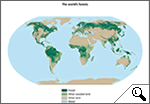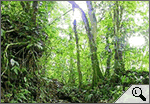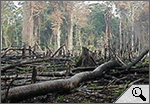|
|
|
|
 |
 |
 > 31% of total land area > The Amazon, the lungs of the Earth > The problem of deforestation dimarts, 25 de gener de 2011
Whereas 2010 was the International Year of Biodiversity, the United Nations (UN) has declared that 2011 is the International Year of Forests, in order to raise collective awareness about the need to conserve them.
The air that we breathe is given to us by the forests, which play a fundamental role in mitigating climate change, given that they store a large quantity of carbon; tropical deforestation is responsible for 20%-25% of global atmospheric carbon dioxide emissions. What's more, forests contain 80% of the earth's biodiversity (this being the total of plant and animal species), they are home to 300 million people, and another 1.6 billion people directly depend on them. All in all, this gives a strong justification for the event's slogan: 'Celebrating forests for people'. The International Year of Forests, which has its own website, will be officially launched a few days from now within the framework of the United Nations Forum on Forests, which began yesterday. 31% of total land areaForests cover almost one third of the Earth's land area (31%, to be exact). Five countries, all of them very large, contain more than half of the world's forests: Russia, Brazil, Canada, the United States and China; at the other extreme there are ten countries that have no forests, and more than fifty in which forests occupy less than 10% of their land area.
The Amazon, the lungs of the EarthSpread over eight countries and traversed by the Amazon River (exceeded in length only by the Nile), the Amazon is the largest rainforest in the world. Known as 'the lungs of the Earth', due to the great quantity of oxygen that it releases into the atmosphere, it is also considered to be the world's most important nature reserve: it contains at least 10% of known species, and among those that scientists have managed to classify there are 40,000 plant, 427 mammal, 1,294 bird, 378 reptile, 427 amphibian and 3,000 fish species.
The problem of deforestationAccording to the latest study carried out by the Food and Agriculture Organization of the United Nations (FAO), the rate of deforestation (above all, the conversion of forests into agricultural land) has decreased in the last ten years (13 million hectares each year, compared to the annual figure of 16 million in the 1990-2000 period), even though it is still very high in some countries. This reduction has been most apparent in Brazil (home to half the Amazon forest) and Indonesia, but not so in Australia, which has been badly affected by forest fires and droughts.
|
Investiga

> Funcions del bosc.

> Logotip de l'Any Internacional del Bosc.

> Grans boscs del món: interactiu.

> Els boscs de Catalunya: vídeo.
I també...
- Conclusions principals de l'estudi de la FAO sobre els recursos forestals al món.
- Bosc: deu coses que tal vegada no sabies.
- Sobre els boscs públics de Catalunya.
- Qüestionari sobre boscs.
- Desforestació i canvi climàtic.
Portada |
Europa Press |
El Punt |
La premsa |
Especials |
Diari de l'escola |
LesFinances.info |
Editorials |
Mail obert |
Els blocs |
Lletres
Tecnologia i ciència | Solidaritat | Cap de 7mana | Campus | El 9 | Presència | Fòrums | Enquestes | Xat | Correu
Traductor | Edicions en Pdf | Wap-pda | Biblioteca | Lletra més grossa
Tecnologia i ciència | Solidaritat | Cap de 7mana | Campus | El 9 | Presència | Fòrums | Enquestes | Xat | Correu
Traductor | Edicions en Pdf | Wap-pda | Biblioteca | Lletra més grossa
| Què és VilaWeb? Publicitat Mapa web Contacte | Una web de Partal, Maresma i Associats, S.L. |




